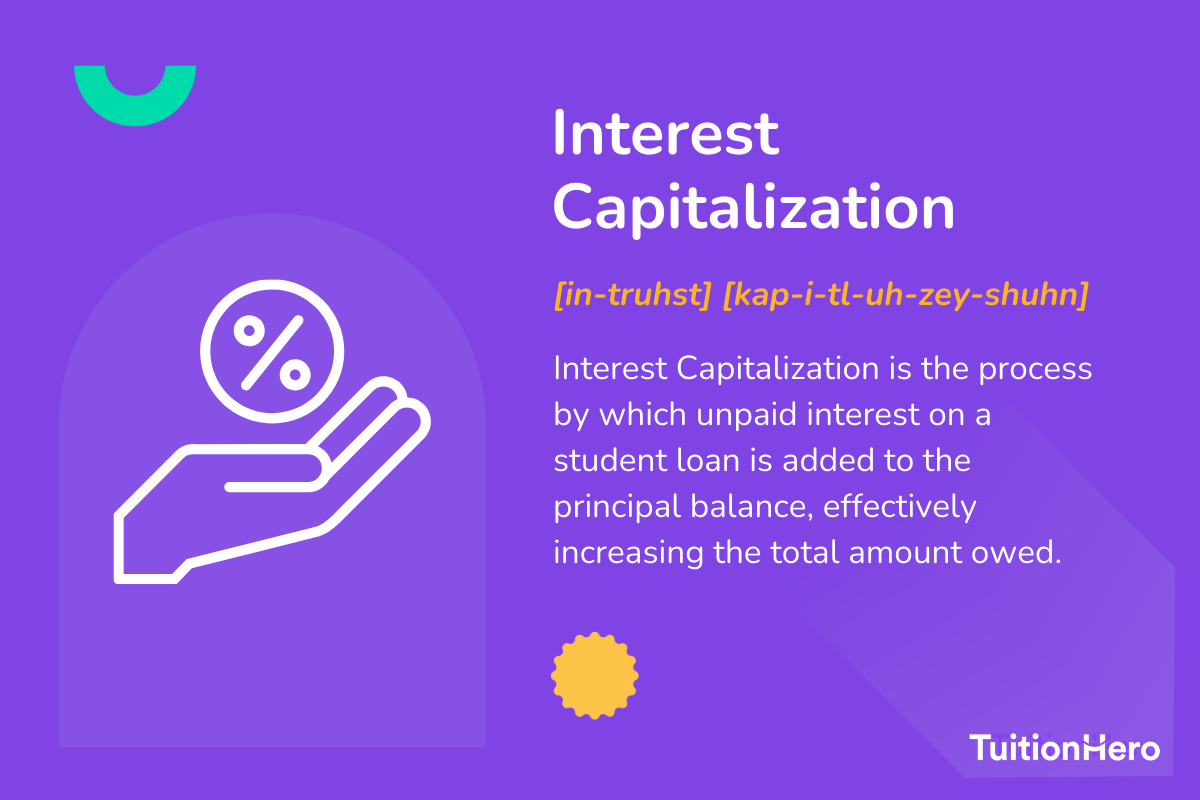Advertiser Disclosure
Last update: March 28, 2025
7 minutes read
Interest Capitalization Explained
Curious about interest capitalization and its effect on loan repayment? Learn the key differences between capitalized and accrued interest and strategies to minimize costs.

By Brian Flaherty, B.A. Economics
Edited by Rachel Lauren, B.A. in Business and Political Economy
Learn more about our editorial standards



By Brian Flaherty, B.A. Economics
Edited by Rachel Lauren, B.A. in Business and Political Economy
Learn more about our editorial standards
Interest capitalization can increase your overall student loan balance and future interest costs. Understanding the difference between capitalized and accrued interest is crucial for effective loan management. Strategies like paying interest during deferment or forbearance periods and refinancing can help minimize costs. Learn how interest capitalization works and discover practical ways to manage your student loans effectively.

Key takeaways
- Capitalized interest increases your loan principal amount
- Calculating accrued interest involves multiplying the interest rate by the principal balance over a specific period
- Avoid the capitalization of accrued interest by paying interest during deferment or forbearance periods
What is capitalized interest?
Capitalized interest refers to the interest added to the principal balance of a loan, increasing the overall debt and eventually resulting in interest being owed on interest.
As interest accrues over time, you won’t typically be charged interest on this accumulated balance right away. Instead, this balance will only be added to your principal during specific capitalization periods outlined in your loan document.
Federal student loans, for instance, often have capitalization events after you graduate from school or after periods of deferment. Private student loans might have more frequent capitalization events, so always double-check the fine print.

How does capitalized interest work?
Capitalized interest works by adding accumulated interest to the loan's principal balance. When a borrower defers payments, the interest doesn't just pause; it grows.
Once deferment ends, that accumulated interest gets added to the principal, leading to higher future interest costs and monthly payments. Because interest is then calculated on the total amount, as opposed to the initial balance, capitalized interest can create a snowball effect.
Capitalized vs. accrued interest
- Accrued interest: This is the amount of unpaid interest accumulated up to a certain date.
- Capitalized interest: This is accrued interest that has been added to the loan's principal. It only happens under specific conditions, like after deferment on student loans.
Example of capitalized interest
Consider a student loan with $30,000 borrowed initially at an average interest rate of 6.05%. If the borrower defers payment for 31 months (and capitalizes annually), the capitalized interest when repayment starts reaches $4,812. Monthly payments rise, and the overall loan balance starts higher, costing a few extra thousand over the life of the loan.
When is interest capitalized for student loans?
- End of a grace period
- End of deferment on unsubsidized loans
- End of forbearance periods
- Voluntarily leaving an income-driven repayment plan
- Failing to submit annual paperwork for income-driven plans
How to avoid capitalized interest?
- Pay interest as it accrues on unsubsidized loans and private loans during school or deferment periods.
- Make lump-sum payments at the end of grace or deferment periods.
- Pay the interest during forbearance or opt for partial forbearance with reduced payments.
For more help understanding how you might navigate different types of loans, you might find this financial guide to student loans helpful.

TuitionHero Tip
Plus, comparing options for refinancing student loans can offer solutions to manage your loan effectively.
Why would you want to capitalize interest?
Capitalized interest allows companies to defer interest expense deductions, maximizing tax benefits. This can enhance earnings reports by spreading out expenses while generating revenue from the asset. For student loans, capitalizing interest defers debt until graduation, potentially easing immediate financial strain.
How do you calculate capitalized interest?
Calculating capitalized interest involves multiplying the interest rate by the principal balance and factoring in how interest accrual is affected by the principal balance increase. Suppose you take out a $30,000 loan at a 6% interest rate that has a fixed capitalization event after one year.
If you don’t make any payments for a year, the loan will accrue $1,800 in total interest. Due to the capitalization event, this means that you'll start the second year with a principal balance of $31,800.
After the second year, your loan balance will have increased to $33,708, which reflects a 6% increase from $31,800. If no capitalization event occurred after the first year, however, your current balance would be just $33,600 (reflecting two years of $1,800 in accrued interest). This example shows how compound interest resulting from capitalization balance can result in a higher overall loan balance.
When should interest be capitalized?
Interest should be capitalized according to the specific schedule outlined in the loan agreement. If interest capitalizes outside these periods, you need to immediately contact your loan servicer to request clarification and an adjustment if a mistake has been made.
Capitalized interest and student loans
Interest capitalization frequently occurs after deferment, forbearance, or grace periods. Federal Direct Loans may capitalize interest at the end of a grace period.
For private loans, this could even happen monthly. Avoiding capitalization by paying accruing interest during these periods can significantly reduce overall loan costs.
Compare private student loans now
TuitionHero simplifies your student loan decision, with multiple top loans side-by-side.
Compare Rates
Strategies to manage capitalized interest
- Pay off accruing interest: Consistently paying off interest before it is added to the principal can significantly lower total repayment costs. For example, effective student loan debt strategies often include making interest payments during school or deferment periods.
- Consider refinancing: Refinancing student loans can offer more favorable terms, potentially reducing the overall effect of capitalized interest.
Let’s continue with a look at specific examples:
Capitalized Interest Scenarios | Initial Loan | Interest Rate | TotalInterest After Two Years | Total Loan Amount After Two Years |
|---|---|---|---|---|
Capitalized after one year | $30,000 | 6.00% | $3,708 | $33,708 |
Not capitalized | $30,000 | 6.00% | $3,600 | $33,600 |
Understanding these scenarios can help manage and minimize the effect of capitalized interest. For support with navigating this, consider exploring student loan and credit card offers that align with your financial goals.
Dos and don'ts of managing interest capitalization in student loans
To manage your student loans effectively, it's crucial to understand how interest capitalization works and the effect it can have on your overall debt. By following a few key strategies and avoiding common pitfalls, you can minimize the long-term cost of your loans and stay on top of your repayment plan.
Do
Understand your loan’s capitalization schedule.
Pay interest during deferment or forbearance.
Consider refinancing to reduce capitalized interest.
Regularly review loan terms for capitalization events.
Don't
Don’t ignore accrued interest; it increases your balance.
Avoid letting capitalized interest accumulate.
Don’t assume federal and private loans are the same.
Don’t stick to default payment plans; consider extra payments.

Advantages and disadvantages of interest capitalization in student loans
Interest capitalization can either increase your loan costs or help you manage your payments, depending on how you handle it. This section highlights the key advantages and disadvantages, helping you make informed decisions about your student loans.
- Minimizes costs: Understanding capitalized interest helps reduce total loan expenses.
- Lowers debt: Paying interest before it capitalizes decreases overall debt.
- Better terms through refinancing: Refinancing can offer lower rates, mitigating capitalized interest effects.
- Informed financial decisions: Awareness of capitalization leads to smarter loan management.
- Tailored strategies: Knowing federal vs. private loan differences aids in strategy planning.
- Increases loan balance: Capitalized interest raises the principal amount.
- Higher payments: A larger principal leads to bigger monthly payments.
- Complex management: Requires careful tracking of loan terms and interest accrual.
- Deferred financial strain: Capitalization after deferment can increase debt.
- Borrower confusion: Lack of understanding can result in unexpected financial burdens.

Why trust TuitionHero
At TuitionHero, we help you manage capitalized interest and its effect on your student loan balance. Our services provide financial education on private loans, refinancing, FAFSA, scholarships, and credit card offers. We guide you through loan repayment complexities to ensure informed decisions.
Frequently asked questions (FAQ)
Capitalized interest increases your principal loan balance, which results in higher future interest costs and larger monthly payments. Paying off or reducing capitalized interest as soon as possible can minimize these financial impacts, leading to a healthier long-term financial outlook. To explore options for managing your student loans, check out our strategies for managing student loan debt.
Yes, interest can capitalize after authorized forbearance periods, significantly increasing your total loan balance. It’s crucial to understand your loan terms and consider making interest payments during forbearance to avoid this. Learn more about managing and refinancing your loans through our student loan refinancing options.
Federal and private loans may handle capitalized interest differently. Federal loans typically capitalize interest at specific intervals, whereas private loans might capitalize interest more frequently, like monthly. This difference can result in varying total loan costs between federal and private loans.
Final thoughts
Understanding and managing capitalized interest is crucial for minimizing your total loan costs. Whether through timing interest payments or considering refinancing options, staying proactive about your student loans can make a significant difference.
At TuitionHero, we’re here to assist you every step of the way, ensuring you can tackle your student debt effectively. Explore our resources to find guidance on managing your finances and making informed decisions.
Source
Author

Brian Flaherty
Brian is a graduate of the University of Virginia where he earned a B.A. in Economics. After graduation, Brian spent four years working at a wealth management firm advising high-net-worth investors and institutions. During his time there, he passed the rigorous Series 65 exam and rose to a high-level strategy position.
Editor

Rachel Lauren
Rachel Lauren is the co-founder and COO of Debbie, a tech startup that offers an app to help people pay off their credit card debt for good through rewards and behavioral psychology. She was previously a venture capital investor at BDMI, as well as an equity research analyst at Credit Suisse.
At TuitionHero, we're not just passionate about our work - we take immense pride in it. Our dedicated team of writers diligently follows strict editorial standards, ensuring that every piece of content we publish is accurate, current, and highly valuable. We don't just strive for quality; we aim for excellence.
Related posts
While you're at it, here are some other college finance-related blog posts you might be interested in.
Shop and compare student financing options - 100% free!

Always free, always fast
TuitionHero is 100% free to use. Here, you can instantly view and compare multiple top lenders side-by-side.

Won’t affect credit score
Don’t worry – checking your rates with TuitionHero never impacts your credit score!

Safe and secure
We take your information's security seriously. We apply industry best practices to ensure your data is safe.
Finished scrolling? Start saving & find your private student loan rate today
Compare Personalized Rates




